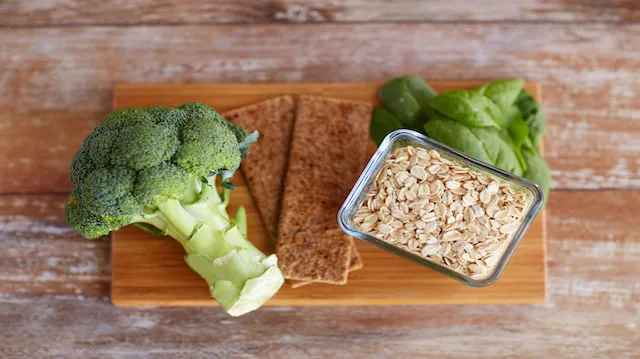A lack of fiber in your diet can cause major damage over the long term. This indigestible substance may seem like just a filler, but it actually serves a number of essential functions in the body.
- Fiber protects your heart: A 1999 study performed at Northwestern University and published in the Journal of the American Medical Association showed that adding 10 more grams of fiber per day to participants’ diets decreased their risk of heart attacks by 29 percent.
- Fiber prevents intestinal disease: A low-fiber diet is associated with an inflammatory condition called diverticulitis, which causes tenderness and cramps in your lower gut, and eventually intestinal damage.
- Fiber helps maintain a healthy weight: Eating a fiber-rich meal helps you feel full and satisfied.
- Fiber fights chronic disease: Inflammation, which is associated with chronic conditions such as high blood pressure and elevated LDL cholesterol, can be lowered by eating enough fiber.
- Fiber feeds your immune system: The friendly bacteria that live in your gut and help you fight off illness thrive by fermenting the fiber that passes undigested through the stomach and small intestine.
- Fiber lowers your risk of stroke: Researchers have found that with every seven grams of fiber consumed on a daily basis, the risk of stroke is decreased by seven percent.
- Fiber keeps your skin clear: By helping move toxins through the system faster, fiber may help prevent acne or other inflammatory skin conditions.
- Fiber supports gut health: Fiber consumption results in the production of short-chain fatty acids by gut bacteria, which helps reduce inflammation and prevents digestive disorders such as irritable bowel syndrome, Crohn’s disease and ulcerative colitis.
Wondering how your diet stacks up? Here are three simple ways to check if you’re getting enough fiber:
Look in the toilet

For our next exercise, look in the toilet next time you go. If your poop sinks, this indicates a lack of fiber in your diet. Healthy poop floats on the surface of the water.
Keep an eye on your figures
There are two types of numbers you can check to determine whether your fiber intake is adequate. The first is weight — if the number on the scale is gradually creeping up over time, experts say this may be a sign of insufficient dietary fiber. Fiber helps you feel satisfied after a meal, and eating too little fiber may contribute to overeating.
The other figure to watch is your cholesterol. If you go to regular checkups with a health-care practitioner, you will have a record of your HDL and LDL cholesterol levels over time. While total cholesterol is no longer considered a major indicator of health, HDL (the healthy type of cholesterol) should always be significantly higher than LDL (the one that is viewed as unhealthy). If your LDL levels are creeping up over the years, increasing your fiber may be one way you can help reverse this damaging process.
Monitor your mood
If you tend to get hungry, tired or moody often throughout the day, this is a sure sign of fluctuations in blood sugar. Fiber is a key nutrient that helps stabilize blood sugar and insulin levels by delaying the absorption of sugar in the digestive system.
It’s time to get busy cranking up your intake of fiber-rich fruits, vegetables, nuts and seeds! Soaked and sprouted gluten-free whole grains and legumes are also excellent sources of fiber, if you tolerate them well. Find out more about natural ways to increase your dietary fiber.
—The Alternative Daily
Sources:
http://jama.jamanetwork.com/article.aspx?articleid=414104
http://ajcn.nutrition.org/content/69/1/30.short
http://europepmc.org/abstract/med/2993226
http://europepmc.org/abstract/med/18953766
http://healthyeating.sfgate.com/check-eating-enough-fiber-10399.html
http://www.mayoclinic.org/healthy-lifestyle/nutrition-and-healthy-eating/in-depth/fiber/art-20043983
http://www.everydayhealth.com/digestive-health/experts-why-is-fiber-important.aspx
